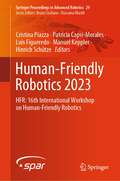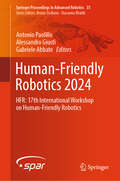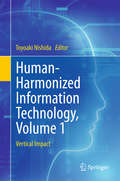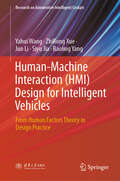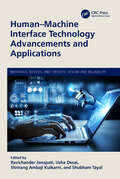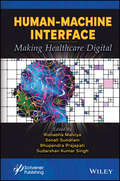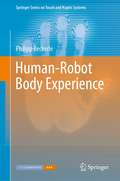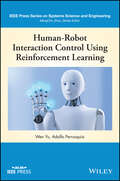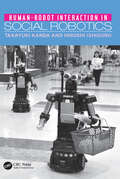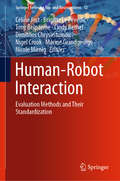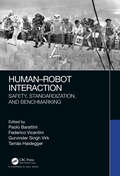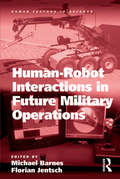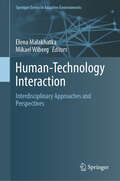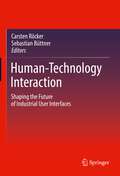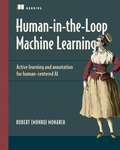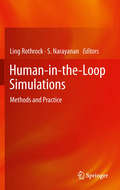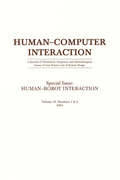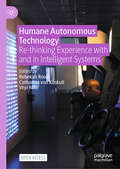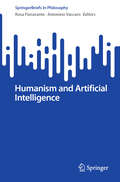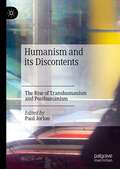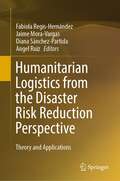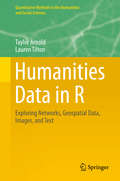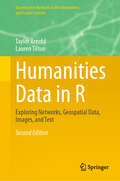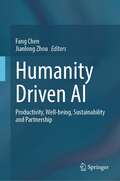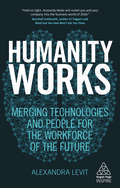- Table View
- List View
Human-Friendly Robotics 2023: HFR: 16th International Workshop on Human-Friendly Robotics (Springer Proceedings in Advanced Robotics #29)
by Hinrich Schütze Cristina Piazza Patricia Capsi-Morales Luis Figueredo Manuel KepplerComprising sixteen independent chapters, this book covers recent advancements and emerging pathways within human-friendly robotics on physical and cognitive levels. Each chapter presents a novel work presented at HFR 2023 by researchers from various robotic domains, where new theories, methodologies, technologies, challenges, and empirical and experimental studies are discussed. The multidisciplinary nature of the authors enriches the compilation with varied viewpoints, making it an excellent resource for academics, researchers, and industry professionals to get acquainted with the state of the art on human-robot interaction.
Human-Friendly Robotics 2024: HFR: 17th International Workshop on Human-Friendly Robotics (Springer Proceedings in Advanced Robotics #35)
by Antonio Paolillo Alessandro Giusti Gabriele AbbateThis book covers a wide range of topics related to human-robot interaction, both physical and cognitive, including theories, methodologies, technologies, and experimental studies. An increasing number of robots operate closely with humans and are expected to interact with people in everyday life, such as patients in hospitals, children in schools, or elderly people in domestic environments. New generations of human-friendly robots must meet the needs of these non-expert users, ensuring safety and trustworthiness both physically and cognitively. To realize this vision, the International Workshop on Human-Friendly Robotics (HFR) provides an opportunity for academic, research, and industry experts to exchange and share their experiences and achievements related to the integration of robots into everyday life. The 17th edition of HFR took place in Lugano, Switzerland, on September 30 and October 1, 2024, and organized by Dalle Molle Institute for Artificial Intelligence (IDSIA), USI-SUPSI.
Human-Harmonized Information Technology, Volume 1
by Toyoaki NishidaGoing from the philosophy and concepts to the implementation and user study, this book presents an excellent overview of Japan's contemporary technical challenges in the field of human-computer interaction. The next information era will be one in which information is used to cultivate human and social potential. Driven by this vision, the outcomes provided in this work were accomplished as challenges to establish basic technologies for achieving harmony between human beings and the information environment by integrating element technologies including real-space communication, human interfaces, and media processing. Ranging from the neuro-cognitive level to the field trial, the research activities integrated novel perceptual technologies that even exceed human ability to sense, capture, and affect the real world. This book grew out of one of the CREST research areas funded by the Japan Science and Technology Agency. The theme of the project is "the creation of human-harmonized information technology for convivial society", where 17 research teams aimed at a common goal. The project promotes a trans-disciplinary approach featuring (1) recognition and comprehension of human behaviors and real-space contexts by utilizing sensor networks and ubiquitous computing, (2) technologies for facilitating man-machine communication by utilizing robots and ubiquitous networks, and (3) content technologies for analyzing, mining, integrating, and structuring multimedia data including those in text, voice, music, and images. This is the first of two volumes, which is contributed by nine team leaders. Besides describing the technical challenges, each contribution lays much weight on discussing the philosophy, concepts, and the implications underlying the project. This work will provide researchers and practitioners in the related areas with an excellent opportunity to find interesting new developments and to think about the relationship between human and information technology.
Human-Machine Interaction: From Human Factors Theory to Design Practice (Research on Automotive Intelligent Cockpit)
by Jun Li Yahui Wang ZhiRong Xue Siyu Jia Baoling YangThis book details the knowledge of digital instrumentation human–machine interaction (HMI) design, infotainment system HMI design, multi-mode interaction design, and driving automation HMI design in intelligent vehicles from the perspective of human factors engineering. It explains the design methodology of intelligent vehicle systems, intelligent driving, and multi-mode interaction from multiple perspectives, covering ergonomics theory, industry specifications, design cases, design principles, trends, and challenges in related fields. This book is suitable for automotive user experience (UX) and HMI designers, product managers, etc. It is also used as a textbook or reference book for automotive design, human–computer interaction design, and other related courses in higher education institutions.
Human-Machine Interface Technology Advancements and Applications (Materials, Devices, and Circuits)
by Ravichander Janapati, Usha Desai, Shrirang Ambaji Kulkarni, and Shubham TayalHuman–Machine Interface Technology Advancements and Applications focuses on analysis, design, and evaluation perspectives in HMI technological breakthroughs and applications. It covers a wide range of ideas, methodologies, approaches, and instruments to give the reader a thorough understanding of the field's current academic and industry practice and debate. Physical, cognitive, social, and emotional factors are all considered in the work, which is exemplified by key application fields such as aerospace, automobile, medicine, and defense. This book covers AI and machine learning methodologies as well as biological signals and HMI applications. Nanotechnology, user interface design, and interactive systems are also featured. The MATLAB approach to signal processing applications is also included.This book discusses advances in the field of human–machine interfaces and provides practical knowledge in biomedical signal processing, AI, and machine learning. It discusses augmented reality/virtual reality-based HMI applications. It examines advances in nanotechnology, user interface design, and interactive systems.This book is intended to serve as a research guide that will both inform readers about the fundamentals of HMI from academic and industrial perspectives and provide a glimpse into how human-centered designers, such as engineers and human factors specialists, will attempt to design and develop human–machine systems in the future.
Human-Machine Interface: Making Healthcare Digital
by Rishabha Malviya Sonali Sundram Bhupendra Prajapati Sudarshan Kumar SinghHUMAN-MACHINE INTERFACE The book contains the latest advances in healthcare and presents them in the frame of the Human-Machine Interface (HMI). The Human-Machine Interface (HMI) industry has witnessed the evolution from a simple push button to a modern touch-screen display. HMI is a user interface that allows humans to operate controllers for machines, systems, or instruments. Most medical procedures are improved by HMI systems, from calling an ambulance to ensuring that a patient receives adequate treatment on time. This book describes the scenario of biomedical technologies in the context of the advanced HMI, with a focus on direct brain-computer connection. The book describes several HMI tools and related techniques for analyzing, creating, controlling, and upgrading healthcare delivery systems, and provides details regarding how advancements in technology, particularly HMI, ensure ethical and fair use in patient care. Audience The target audience for this book is medical personnel and policymakers in healthcare and pharmaceutical professionals, as well as engineers and researchers in computer science and artificial intelligence.
Human-Robot Body Experience (Springer Series on Touch and Haptic Systems)
by Philipp BeckerleThis monograph presents innovative research regarding the body experience of human individuals who are using assistive robotic devices such as wearable robots or teleoperation systems. The focus is set on human-in-the-loop experiments that help to empirically evaluate how users experience devices. Moreover, these experiments allow for further examination of the underlying mechanisms of body experience through extending existing psychological paradigms, e.g., by disentangling tactile feedback from contacts. Besides reporting and discussing psychological examinations, the influence of various aspects of engineering design is investigated, e.g., different implementations of haptic interfaces or robot control. As haptics are of paramount importance in this tight type of human-robot interaction, it is explored with respect to modality as well as temporal and spatial effects. The first part of the book motivates the research topic and gives an in-depth analysis of the experimental requirements. The second and third part present experimental designs and studies of human-robot body experience regarding the upper and lower limbs as well as cognitive models to predict them. The fourth part discusses a multitude of design considerations and provides directions to guide future research on bidirectional human-machine interfaces and non-functional haptic feedback.
Human-Robot Interaction Control Using Reinforcement Learning (IEEE Press Series on Systems Science and Engineering)
by Wen Yu Adolfo PerrusquiaA comprehensive exploration of the control schemes of human-robot interactions In Human-Robot Interaction Control Using Reinforcement Learning, an expert team of authors delivers a concise overview of human-robot interaction control schemes and insightful presentations of novel, model-free and reinforcement learning controllers. The book begins with a brief introduction to state-of-the-art human-robot interaction control and reinforcement learning before moving on to describe the typical environment model. The authors also describe some of the most famous identification techniques for parameter estimation. Human-Robot Interaction Control Using Reinforcement Learning offers rigorous mathematical treatments and demonstrations that facilitate the understanding of control schemes and algorithms. It also describes stability and convergence analysis of human-robot interaction control and reinforcement learning based control. The authors also discuss advanced and cutting-edge topics, like inverse and velocity kinematics solutions, H2 neural control, and likely upcoming developments in the field of robotics. Readers will also enjoy: A thorough introduction to model-based human-robot interaction control Comprehensive explorations of model-free human-robot interaction control and human-in-the-loop control using Euler angles Practical discussions of reinforcement learning for robot position and force control, as well as continuous time reinforcement learning for robot force control In-depth examinations of robot control in worst-case uncertainty using reinforcement learning and the control of redundant robots using multi-agent reinforcement learning Perfect for senior undergraduate and graduate students, academic researchers, and industrial practitioners studying and working in the fields of robotics, learning control systems, neural networks, and computational intelligence, Human-Robot Interaction Control Using Reinforcement Learning is also an indispensable resource for students and professionals studying reinforcement learning.
Human-Robot Interaction in Social Robotics
by Hiroshi Ishiguro Takayuki KandaHuman–Robot Interaction in Social Robotics explores important issues in designing a robot system that works with people in everyday environments. Edited by leading figures in the field of social robotics, it draws on contributions by researchers working on the Robovie project at the ATR Intelligent Robotics and Communication Laboratories, a world leader in humanoid interactive robotics. The book brings together, in one volume, technical and empirical research that was previously scattered throughout the literature. Taking a networked robot approach, the book examines how robots work in cooperation with ubiquitous sensors and people over telecommunication networks. It considers the use of social robots in daily life, grounding the work in field studies conducted at a school, train station, shopping mall, and science museum. Critical in the development of network robots, these usability studies allow researchers to discover real issues that need to be solved and to understand what kinds of services are possible. The book tackles key areas where development is needed, namely, in sensor networks for tracking humans and robots, humanoids that can work in everyday environments, and functions for interacting with people. It introduces a sensor network developed by the authors and discusses innovations in the Robovie humanoid, including several interactive behaviors and design policies. Exploring how humans interact with robots in daily life settings, this book offers valuable insight into how robots may be used in the future. The combination of engineering, empirical, and field studies provides readers with rich information to guide in developing practical interactive robots.
Human-Robot Interaction: Evaluation Methods and Their Standardization (Springer Series on Bio- and Neurosystems #12)
by Céline Jost Brigitte Le Pévédic Tony Belpaeme Cindy Bethel Dimitrios Chrysostomou Nigel Crook Marine Grandgeorge Nicole MirnigThis book offers the first comprehensive yet critical overview of methods used to evaluate interaction between humans and social robots. It reviews commonly used evaluation methods, and shows that they are not always suitable for this purpose. Using representative case studies, the book identifies good and bad practices for evaluating human-robot interactions and proposes new standardized processes as well as recommendations, carefully developed on the basis of intensive discussions between specialists in various HRI-related disciplines, e.g. psychology, ethology, ergonomics, sociology, ethnography, robotics, and computer science. The book is the result of a close, long-standing collaboration between the editors and the invited contributors, including, but not limited to, their inspiring discussions at the workshop on Evaluation Methods Standardization for Human-Robot Interaction (EMSHRI), which have been organized yearly since 2015. By highlighting and weighing good and bad practices in evaluation design for HRI, the book will stimulate the scientific community to search for better solutions, take advantages of interdisciplinary collaborations, and encourage the development of new standards to accommodate the growing presence of robots in the day-to-day and social lives of human beings.
Human-Robot Interaction: Safety, Standardization, and Benchmarking
by Gurvinder Singh Virk Paolo Barattini Federico Vicentini Tamas HaideggerHuman-Robot Interaction: Safety, Standardization, and Benchmarking provides a comprehensive introduction to the new scenarios emerging where humans and robots interact in various environments and applications on a daily basis. The focus is on the current status and foreseeable implications of robot safety, approaching these issues from the standardization and benchmarking perspectives. Featuring contributions from leading experts, the book presents state-of-the-art research, and includes real-world applications and use cases. It explores the key leading sectors—robotics, service robotics, and medical robotics—and elaborates on the safety approaches that are being developed for effective human-robot interaction, including physical robot-human contacts, collaboration in task execution, workspace sharing, human-aware motion planning, and exploring the landscape of relevant standards and guidelines. <P><P>Features <P><P>Presenting a comprehensive introduction to human-robot interaction in a number of domains, including industrial robotics, medical robotics, and service robotics <P><P>Focusing on robot safety standards and benchmarking <P><P>Providing insight into current developments in international standards <P><P>Featuring contributions from leading experts, actively pursuing new robot development
Human-Robot Interactions in Future Military Operations (Human Factors in Defence)
by Florian JentschSoldier-robot teams will be an important component of future battle spaces, creating a complex but potentially more survivable and effective combat force. The complexity of the battlefield of the future presents its own problems. The variety of robotic systems and the almost infinite number of possible military missions create a dilemma for researchers who wish to predict human-robot interactions (HRI) performance in future environments. Human-Robot Interactions in Future Military Operations provides an opportunity for scientists investigating military issues related to HRI to present their results cohesively within a single volume. The issues range from operators interacting with small ground robots and aerial vehicles to supervising large, near-autonomous vehicles capable of intelligent battlefield behaviors. The ability of the human to 'team' with intelligent unmanned systems in such environments is the focus of the volume. As such, chapters are written by recognized leaders within their disciplines and they discuss their research in the context of a broad-based approach. Therefore the book allows researchers from differing disciplines to be brought up to date on both theoretical and methodological issues surrounding human-robot interaction in military environments. The overall objective of this volume is to illuminate the challenges and potential solutions for military HRI through discussion of the many approaches that have been utilized in order to converge on a better understanding of this relatively complex concept. It should be noted that many of these issues will generalize to civilian applications as robotic technology matures. An important outcome is the focus on developing general human-robot teaming principles and guidelines to help both the human factors design and training community develop a better understanding of this nascent but revolutionary technology. Much of the research within the book is based on the Human Research and Engineering Directorate (HRED), U.S. Army Research Laboratory (ARL) 5-year Army Technology Objective (ATO) research program. The program addressed HRI and teaming for both aerial and ground robotic assets in conjunction with the U.S. Army Tank and Automotive Research and Development Center (TARDEC) and the Aviation and Missile Development Center (AMRDEC) The purpose of the program was to understand HRI issues in order to develop and evaluate technologies to improve HRI battlefield performance for Future Combat Systems (FCS). The work within this volume goes beyond the research results to encapsulate the ATO's findings and discuss them in a broader context in order to understand both their military and civilian implications. For this reason, scientists conducting related research have contributed additional chapters to widen the scope of the original research boundaries.
Human-Technology Interaction: Interdisciplinary Approaches and Perspectives (Springer Series in Adaptive Environments)
by Mikael Wiberg Elena MalakhatkaDelves into the evolving landscape of human-technology interaction (HTI), encompassing various facets from design and implementation to psychological impacts and strategic considerations. The book begins with foundational theories in HTI and strategic design, progressing to practical applications and implications across multiple domains such as human-robot interaction, augmented and virtual reality, and the Internet of Things. Subsequent chapters explore the integration of AI and machine learning with human processes, the psychological effects of technology, and user experience design. The authors address specialized areas including assistive technologies, game design, and the fusion of art, science, and technology and discuss the role of technology in learning and education, and urban sustainability through digital innovations. Concluding with a look at future trends like transhumanism, Human-Technology Interaction - Interdisciplinary Approaches and Perspectives offers a comprehensive analysis of how technologies shape human experiences, behaviours, and societal development.
Human-Technology Interaction: Shaping the Future of Industrial User Interfaces
by Carsten Röcker Sebastian BüttnerDigitalization and automation are leading to fundamental changes in the industrial landscape. In the German-speaking countries, this development is often summarized under the term Industry 4.0. Simultaneously, interaction technologies have made huge developments in the last decades. The use of mobile devices and touch screens is ubiquitous, augmented and virtual reality technologies have made their way into the market and new interaction concepts have become established. While new interaction technologies offer new possibilities for organizing or executing work in the context of Industry 4.0, the transformation of industrial processes also creates a need for new work practices. This book sheds light on the interplay of Industry 4.0 and new interaction technologies. It presents selected research articles on the topic of Human-Technology Interaction in the context of Industry 4.0. Researchers from various disciplines present the current state of research with regard to future interactions with production environments to develop a common vision of how to design future interactions in the industrial domain. In this context, various topics are covered: a detailed overview on assistive systems for supporting manual work is given, including technological and design aspects as well as implementation strategies. Industrial use-cases for extended reality (XR) technologies such as augmented and virtual reality (AR and VR) are presented, also covering aspects of how to author content in XR environments. The role of new work practices is examined, for example, by presenting concepts of gamification and human-machine teamwork for supporting well-being. Finally, topics of trust and technology acceptance are discussed in the context of Industry 4.0. Given this broad perspective, a vision is sketched of how to design future human-technology interactions in a way that realizes their full technical and human potential.
Human-in-the-Loop Machine Learning: Active learning and annotation for human-centered AI
by Robert (Munro) MonarchHuman-in-the-Loop Machine Learning lays out methods for humans and machines to work together effectively. Summary Most machine learning systems that are deployed in the world today learn from human feedback. However, most machine learning courses focus almost exclusively on the algorithms, not the human-computer interaction part of the systems. This can leave a big knowledge gap for data scientists working in real-world machine learning, where data scientists spend more time on data management than on building algorithms. Human-in-the-Loop Machine Learning is a practical guide to optimizing the entire machine learning process, including techniques for annotation, active learning, transfer learning, and using machine learning to optimize every step of the process. Purchase of the print book includes a free eBook in PDF, Kindle, and ePub formats from Manning Publications. About the technology Machine learning applications perform better with human feedback. Keeping the right people in the loop improves the accuracy of models, reduces errors in data, lowers costs, and helps you ship models faster. About the book Human-in-the-Loop Machine Learning lays out methods for humans and machines to work together effectively. You&’ll find best practices on selecting sample data for human feedback, quality control for human annotations, and designing annotation interfaces. You&’ll learn to create training data for labeling, object detection, and semantic segmentation, sequence labeling, and more. The book starts with the basics and progresses to advanced techniques like transfer learning and self-supervision within annotation workflows. What's inside Identifying the right training and evaluation data Finding and managing people to annotate data Selecting annotation quality control strategies Designing interfaces to improve accuracy and efficiency About the author Robert (Munro) Monarch is a data scientist and engineer who has built machine learning data for companies such as Apple, Amazon, Google, and IBM. He holds a PhD from Stanford. Robert holds a PhD from Stanford focused on Human-in-the-Loop machine learning for healthcare and disaster response, and is a disaster response professional in addition to being a machine learning professional. A worked example throughout this text is classifying disaster-related messages from real disasters that Robert has helped respond to in the past. Table of Contents PART 1 - FIRST STEPS 1 Introduction to human-in-the-loop machine learning 2 Getting started with human-in-the-loop machine learning PART 2 - ACTIVE LEARNING 3 Uncertainty sampling 4 Diversity sampling 5 Advanced active learning 6 Applying active learning to different machine learning tasks PART 3 - ANNOTATION 7 Working with the people annotating your data 8 Quality control for data annotation 9 Advanced data annotation and augmentation 10 Annotation quality for different machine learning tasks PART 4 - HUMAN–COMPUTER INTERACTION FOR MACHINE LEARNING 11 Interfaces for data annotation 12 Human-in-the-loop machine learning products
Human-in-the-Loop Simulations
by S. Narayanan Ling RothrockHuman-in-the-Loop Simulations is a compilation of articles from experts in the design, development, and use of human-in-the-loop simulations. The first section of the handbook consists of papers on fundamental concepts in human-in-the-loop simulations, such as object-oriented simulation development, interface design and development, and performance measurement. The second section includes papers from researchers who utilized HITL simulations to inform models of cognitive processes to include decision making and metacognition. The last section describes human-in-the-loop processes for complex simulation models in trade space exploration and epidemiological analyses. Human-in-the-Loop Simulations is a useful tool for multiple audiences, including graduate students and researchers in engineering and computer science.
Human-robot Interaction: A Special Double Issue of human-computer Interaction
by Human-Robot InteractionThis special issue is made up of five articles which cover the emerging area of human-robot interaction. The first paper offers a theoretical ecological framework for the design of personal service robots in homes of elderly people. Next, a field study of two robots that visited a children's elementary school in Japan for two weeks, with the purpos
Humane Autonomous Technology: Re-thinking Experience with and in Intelligent Systems
by Virpi Roto Rebekah Rousi Catharina Von KoskullThis open access book takes a human-focused multidisciplinary look at the ways in which autonomous technology shapes experience, affecting human lives and ways of working in settings ranging from the arts, design, and service to maritime and industry. The book focuses on the humane, observing how technology can be designed and implemented in an ethical, human-centered way. Chapters in this book highlight factors that impinge on the humane and ethical, such as challenging questions of intellectual property rights, roles of humans, biases, and the uptake of other deviant human traits. Through delving into a range of dimensions and contexts from culture, the arts and design, to service, heavy industry and maritime, the contributors demonstrate that artificial intelligence and its related autonomous systems need to be understood holistically, as a system of systems, that should be working for the benefit of human present and future.
Humanism and Artificial Intelligence (SpringerBriefs in Philosophy)
by Antonino Vaccaro Rosa FioravanteThis book contributes to the debate on humanism in AI by providing a, so far lacking, comprehensive account of the significant challenges posed by AI to organizations from a humanistic perspective. It does so in two ways: by discussing ethical challenges of AI using humanistic assumptions, normative implications, and underpinning theoretical stances and by focusing on those challenges that can be considered well suited to be tackled from a humanistic perspective as they are more urgent for humanistic-led organizations, as well as those willing to become so. This new perspective allows for new and important discussions, making the book an important read for philosophers of technology and AI.
Humanism and its Discontents: The Rise of Transhumanism and Posthumanism
by Paul JorionThis book explains that while posthumanism rose in opposition to the biblical contention that ‘Man was created in the image of God’, transhumanism ascertained the complementary view that ‘Man has been assigned dominion over all creatures’, further exploring a path that had been opened up by the Enlightenment’s notion of human perfectibility.It explains also how posthumanism and transhumanism relate to deconstruction theory, and on a broader level to capitalism, libertarianism, and the fight against human extinction which may involve trespassing the boundary of the skin, achieving individual immortality or dematerialization of the Self and colonisation of distant planets and stars.Two authors debate about truth and reason in today’s world, the notion of personhood and the legacy of the Nietzschean Superhuman in the current varieties of anti-humanism.
Humanitarian Logistics from the Disaster Risk Reduction Perspective: Theory and Applications
by Angel Ruiz Diana Sánchez-Partida Fabiola Regis-Hernández Jaime Mora-VargasThis book aims to clarify the priorities of the Sendai Framework for the DRR 2015 – 2030, through gathering recent contributions addressing the different ways researchers define, measure, reduce, and manage risk in the challenge of the DRR. Beyond a discussion of the different definitions of disaster risk; this book provides contributions focused on optimization approaches that support the decision-making process in the challenge of managing DRR problems considering emerging disaster risks in the medium and long term, as well as national and local applications. Some of the topics covered include network flow problems, stochastic optimization, discrete optimization, multi-objective programming, approximation techniques, and heuristic approaches.The target audience of the book includes professionals who work in Linear Programming, Logistics, Optimization (Mathematical, Robust, Stochastic), Management Science, Mathematical Programming, Networks, Scheduling, Simulation, Supply Chain Management, Sustainability, and similar areas. It can be useful for researchers, academics, graduate students, and anyone else doing research in the field
Humanities Data in R
by Taylor Arnold Lauren TiltonThis pioneering book teaches readers to use R within four core analytical areas applicable to the Humanities: networks, text, geospatial data, and images. This book is also designed to be a bridge: between quantitative and qualitative methods, individual and collaborative work, and the humanities and social sciences. Humanities Data with R does not presuppose background programming experience. Early chapters take readers from R set-up to exploratory data analysis (continuous and categorical data, multivariate analysis, and advanced graphics with emphasis on aesthetics and facility). Following this, networks, geospatial data, image data, natural language processing and text analysis each have a dedicated chapter. Each chapter is grounded in examples to move readers beyond the intimidation of adding new tools to their research. Everything is hands-on: networks are explained using U. S. Supreme Court opinions, and low-level NLP methods are applied to short stories by Sir Arthur Conan Doyle. After working through these examples with the provided data, code and book website, readers are prepared to apply new methods to their own work. The open source R programming language, with its myriad packages and popularity within the sciences and social sciences, is particularly well-suited to working with humanities data. R packages are also highlighted in an appendix. This book uses an expanded conception of the forms data may take and the information it represents. The methodology will have wide application in classrooms and self-study for the humanities, but also for use in linguistics, anthropology, and political science. Outside the classroom, this intersection of humanities and computing is particularly relevant for research and new modes of dissemination across archives, museums and libraries.
Humanities Data in R: Exploring Networks, Geospatial Data, Images, and Text (Quantitative Methods in the Humanities and Social Sciences)
by Taylor Arnold Lauren TiltonThis book teaches readers to integrate data analysis techniques into humanities research practices using the R programming language. Methods for general-purpose visualization and analysis are introduced first, followed by domain-specific techniques for working with networks, text, geospatial data, temporal data, and images. The book is designed to be a bridge between quantitative and qualitative methods, individual and collaborative work, and the humanities and social sciences. The second edition of the text is a significant revision, with almost every aspect of the text rewritten in some way. The most notable difference is the incorporation of new R packages such as ggplot2 and dplyr that center broad data-science concepts. This 2nd edition of Humanities Data with R does not presuppose background programming experience. Early chapters take readers from R set-up to exploratory data analysis, with one chapter dedicated to each stage of the data-science pipeline (data collection, visualization, manipulation, and relational joins). Following this, text analysis, networks, temporal data, geospatial data, and image analysis each have a dedicated chapter. These are grounded in examples to move readers beyond the intimidation of adding new tools to their research. The final section of the book extends the core material with additional computer science techniques for processing large datasets. Everything is hands-on: image analysis is explained using digitized photographs from the 1930s, and networks are applied to page links on Wikipedia. After working through these examples with the provided data, code and book website, readers are prepared to apply new methods to their own work. The open source R programming language, with its myriad packages and popularity within the sciences and social sciences, is particularly well-suited to working with humanities data. R packages are also highlighted in an appendix. The methodology will have wide application in classrooms and self-study for the humanities, but also for use in linguistics, anthropology, and political science. Outside the classroom, this intersection of humanities and computing is particularly relevant for research and new modes of dissemination across archives, museums and libraries.
Humanity Driven AI: Productivity, Well-being, Sustainability and Partnership
by Fang Chen Jianlong ZhouArtificial Intelligence (AI) is changing the world around us, and it is changing the way people are living, working, and entertaining. As a result, demands for understanding how AI functions to achieve and enhance human goals from basic needs to high level well-being (whilst maintaining human health) are increasing. This edited book systematically investigates how AI facilitates enhancing human needs in the digital age, and reports on the state-of-the-art advances in theories, techniques, and applications of humanity driven AI. Consisting of five parts, it covers the fundamentals of AI and humanity, AI for productivity, AI for well-being, AI for sustainability, and human-AI partnership. Humanity Driven AI creates an important opportunity to not only promote AI techniques from a humanity perspective, but also to invent novel AI applications to benefit humanity. It aims to serve as the dedicated source for the theories, methodologies, and applications on humanity driven AI, establishing state-of-the-art research, and providing a ground-breaking book for graduate students, research professionals, and AI practitioners.
Humanity Works: Merging Technologies and People for the Workforce of the Future (Kogan Page Inspire)
by Alexandra LevitThe professional landscape is transforming, and the only way to maintain competitive advantage is to maximize the unique skills of your workforce. In Humanity Works, bestselling author, global workplace consultant and futurist Alexandra Levit provides a guide to making the most of the human traits of creativity, judgement, problem solving and interpersonal sensitivity. Revealing what the 'robot takeover' will really look like, how talent and machines can work side by side and how you can make organizational structures more agile and innovation focused, this book will prepare you to lead organizations of the future.Humanity Works doesn't just explain the fascinating trends of the future of work; it condenses cutting-edge academic and business thinking to show what you can do about the future right now. Original, real-life case studies including Nestle, The Washington Post, Deloitte, and Pepsi combined with exercises and workplace tools will equip you for staying innovative and successful in the wake of major workplace disruption. Everything hinges on capturing the human edge in your organization.
